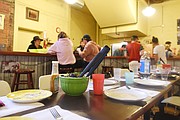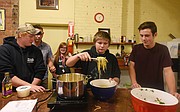Flathead youth center takes different approach to justice
Flathead Valley youths referred to the Center for Restorative Youth Justice program may dread carrying out the “punishment” for their crime, but many juveniles in the program said they were surprised at what they found when they walked through the doors.
“I didn’t want to do this at first,” Ashley O’Grady admitted. “I thought, ‘oh this is going to suck.’”
Now O’Grady said when she is finished with her community-service hours, she plans to become a volunteer.
The Center for Restorative Youth Justice provides individualized support that treats victims, young offenders and their families with respect.
The program headquarters in Kalispell looks more like a hip cafe than a justice center. The space is bright and open and artwork adorns the walls.
O’Grady, 17, was one of more than a dozen local teenagers who recently took part in the center’s Trellis Project event.
The youth started the evening by sitting in comfortable chairs and couches positioned in a circle for a “Real Talk,” discussion to explore their personal choices.
The local teens listened respectfully as Executive Director Burket Kniveton explained his point of view on the youth taking personal accountability for their actions.
“We work with youth in the Flathead Valley to provide opportunities for them to feel empowered and have more connections to the community. It’s a more holistic way of looking at crime,” he said.
Rather than coming out with a slap on the wrist — typically for drinking, drug or petty theft-related crimes — the aim is for local youths in the program to come out with a different perspective about themselves and their role in community.
“We want them to understand what happens when an offense occurs. We want them to understand the impact it had on people, and we want them to repair the harm from that situation,” Kniveton said.
“Being here isn’t just about putting in your hours,” O’Grady said. “We reflect on what we did and why we might have done it, be we also talk realistically about what we could do differently if we were put in the situation again.”
Alexys Anselmo, 17, said her brush with the law is something she’s not proud of. But the restorative program has made her think about her future differently.
“I realized I needed to be more independent and stand my ground, and think more about where I want to be in life, not focus on where other people are going,” she said. “There’s more to life than what your friends are doing.”
After the discussion, the teens headed to the kitchen where they promptly started gathering ingredients for a pasta and salad dinner, chopping vegetables, boiling noodles and listening to Kniveton’s instruction. At the end of the night, they sat together and enjoyed a family-style dinner.
On other days of the week, youths take part in mind-body skills such as music, yoga and martial arts. Juveniles in the program also participate in drug and alcohol workshops, study halls and local food projects.
The center is working to expand opportunities for local youths to get their first job, succeed at school and fulfill their potential. Kniveton said the organization also is hoping to expand its volunteer and leadership opportunities for those who want to get involved without a court or counselor referral.
Although the aim of the program is non-traditional, the results are real, according to the organization’s leaders. Compared to the national average, youths who participate in Flathead Valley’s restorative justice program are three times less likely to offend again.
“Our main goals are to keep kids out of jail and keep them united with their family and the community. Research has shown that is the best place for them to be,” Board President Dave Bailon said.
Last year about 388 Flathead Valley youths participated in the program.
Half of the young offenders live in low-income households. Thirty percent have a parent who has been involved in the justice system, and 45 percent previously had been suspended from school.
“While these statistics are powerful,” Kniveton said, the youths at the justice center are “just regular kids.”
“We want to let them know there is a community here that doesn’t just push them away,” he said. “And we are going to give them that opportunity to define themselves apart from the decision they made.”
Reporter Breeana Laughlin can be reached at 758-4441 or blaughlin@dailyinterlake.com.






